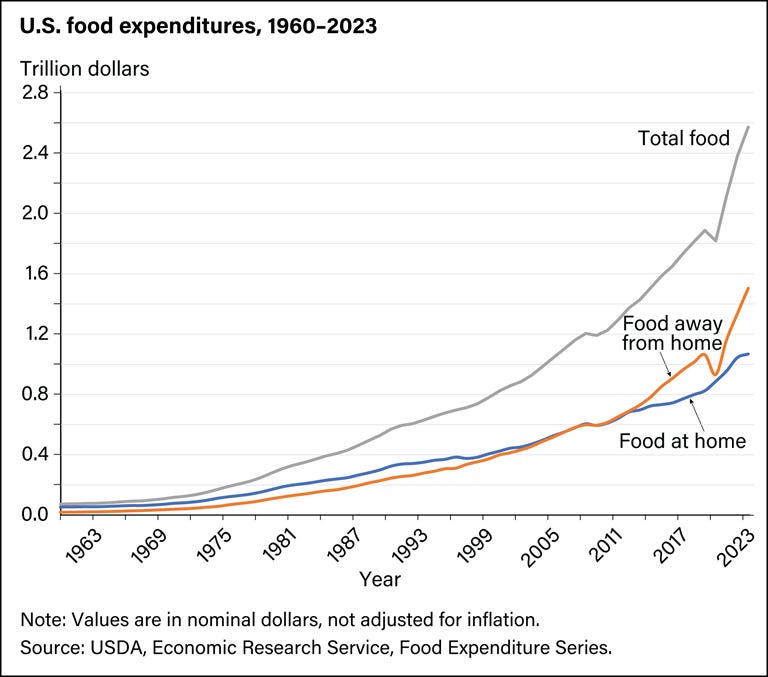AI solves the overproduction of the elites, but probably not how you think it will
“A common theme that arises from the analysis of 200 past societies sliding into a crisis…is elite overproduction: when you have too many elite aspirants vying for a fixed number of power positions. When they’re frustrated in getting the positions that they expect, many of them turn to trying to infect, overthrow the unjust social order as they perceive it.”
America has been in an elite overproduction crisis for most of the past half century. We’ve 10xed the number of college graduates, but traditional elite jobs— law, academia, C-suite executives— have remained flat. The result is increasingly existential intra-elite competition. Every culture war is a manifestation of this collective class anxiety. Everybody hears the music ending, and they are scared.
There’s two schools of thought on how AI will play into this:
AGI is hype and nothing will change.
The white collar job market is about get Detroit-ed and a permanent underclass is about to form.
I have a contrarian view:
AI automation will live up to our craziest expectations and automate 90% of what professional service firms do today.
It’s also going to 100x the number of prestigious, well-paying white collar jobs.
Apps are dead.
People hate computers. We want plain old services again.
At my startup, thanks to a racket of startups selling to other startups, there is a SaaS product for everything: company formation, tax, compliance, contracts, global hiring. We almost immediately scaled beyond these tools. Every real business eventually gets weird edge cases that a Next.js dashboard doesn’t solve. For anything important, I don’t know what I don’t know. I don’t need an agreement, I need a lawyer to lean back in his Herman Miller chair, squint at me through his Zoom camera, and tell me what his gut says.
Then it hit me: the rich already do this. The elite get human expertise, judgment, and intuition, the masses get technoslop. We're using TurboTax to fumble through our taxes while the wealthy have teams of CPAs finding loopholes we've never heard of. We're trusting LegalZoom for our wills and contracts while the elite have lawyers on retainer. We're relying on WebMD and ChatGPT for our health concerns while the rich have concierge doctors making house calls. We fig leaf poor imitations of human service as “convenience” and eat out of the app trough. Oink oink little piggies.
But if we have an overproduction of elites, why isn’t judgement scaling? Professional services are bottlenecked by the ultimate non-renewable resource: time.
American professional services is modern day feudalism. When you’re paying an hourly “blended rate” (tithe) to a professional service firm, you’re paying for hundreds of hours of overeducated workers (serfs) supporting a few customer-facing experts (knights.) But really all you care about is getting the knights. And even with half the country brandishing postgraduate degrees, we can only satisfy a fraction of the demand. Offshoring isn’t as cheap as it once was as India et. al. enter the global middle class. The result is most firms are turning away customers.
Every professional job function that charges an hourly rate is a market inefficiency that will be corrected by AI.
All the serf work at professional services will be automated by AI: preparing taxes, researching deals, drafting memos, keying in data. I say let AI handle the work. Every time I hear a banker humblebrag about a 120 hour week, I picture a switchboard operator bragging about how many calls she can connect per minute. We’ve been competing with computers at computing, and it’s time to wave the white flag.
So will engineer, lawyer, and banker salaries collapse? Recent economic history suggests the opposite will occur.
Things get weird when goods transition from scarcity to post-scarcity. Economic models that assume humans are cost optimizing machines fall apart. People start to spend more.
Look at what happened to food. It turns out the American consumer has an infinitely elastic demand for curated experiences:
I think this is what the graph of professional service spend will look like post-AGI. Once AI gives everybody a back office, suddenly the equation inverts and professional service providers can scale to meet demand. More professionals can focus on giving the actual advice, perspective, and judgement that clients want to pay for but can’t buy today.
We’ll transition from a handful of F50s in costal cities incestously servicing each other to a vast network of millions of skilled professionals servicing millions of clients. America will fulfill its destiny is to become one massive Main Street stretching from the Atlantic to the Pacific.






